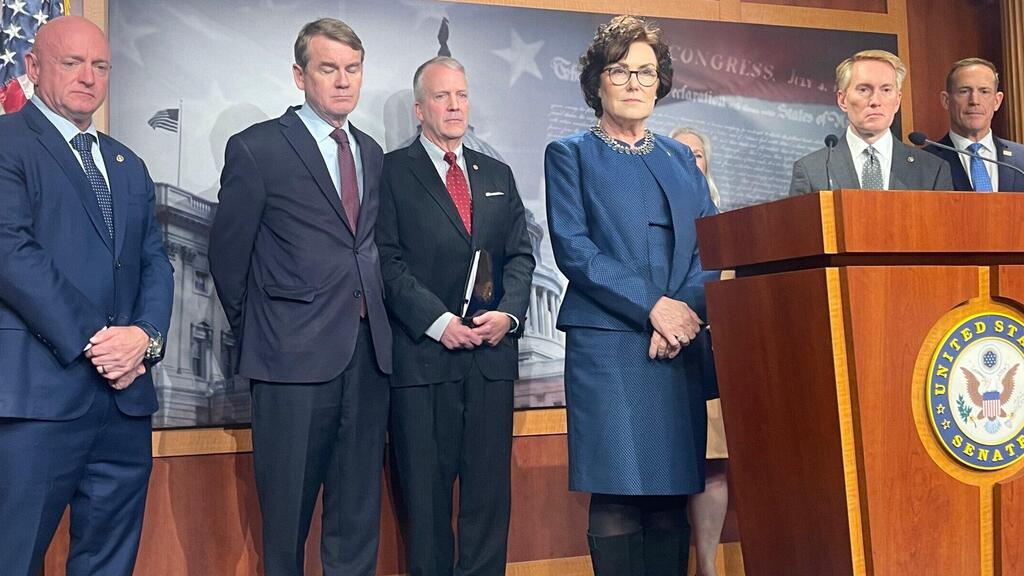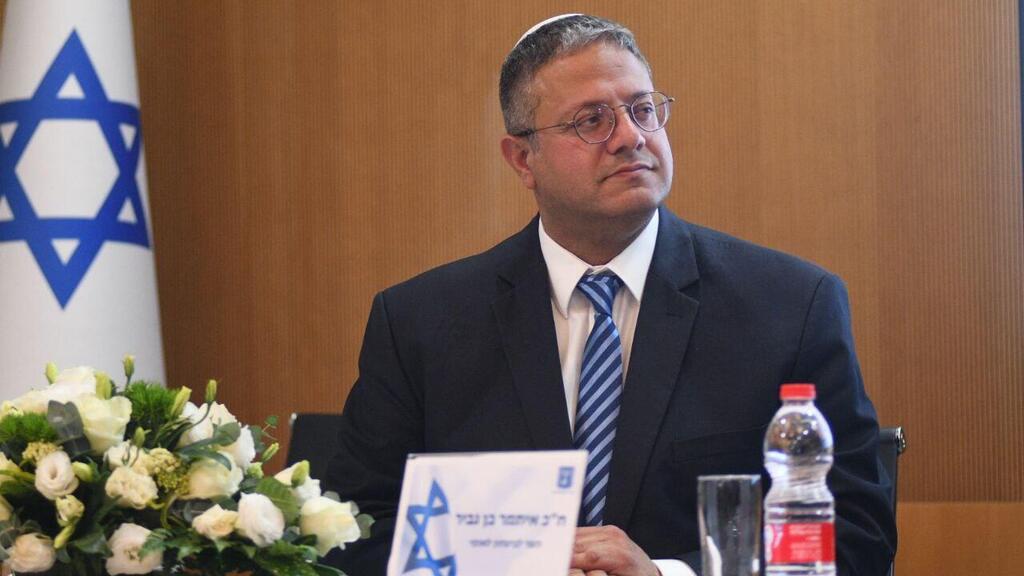Getting your Trinity Audio player ready...
Judging by her response to a question at a press briefing on Tuesday, Jackie Rosen had likely read the headlines involving Israel she had made over the past week. She was prepared to deflect.
Had she really nixed meetings with two government ministers in Israel’s extremist Religious Zionist bloc, as Axios had reported?
“Let’s focus on what these historic agreements mean,” the Nevada Democrat said, referring to the Abraham Accords, the 2020 normalization agreements with multiple Arab countries that edged Israel closer to its dream of peaceful coexistence with its neighbors.
Rosen and six other U.S. senators last week toured four of the five signatories to the accords, including Israel — where Bezalel Smotrich and Itamar Ben-Gvir, who have incurred international criticism, currently hold powerful positions in Benjamin Netanyahu’s coalition.
“The real optimism between these countries for partnerships, for people to people relationships, things that benefit their people on the ground, like markets … energy, agriculture technology, and, just coming out of the global pandemic, healthcare,” Rosen added.
For all their optimism on Tuesday, however, the senators acknowledged, in guarded language, that plans by Smotrich to annex territories in the West Bank and Ben-Gvir’s provocative actions on Jerusalem’s Temple Mount could not only undercut the aim of their tour — to seek ways to expand the accords to other countries — but could also scuttle them entirely.
“We were very clear when we spoke with Prime Minister Netanyahu that it is important that they would maintain the status quo and they not do anything that would impede the progress of the Abraham accords and a negotiated two-state solution,” Rosen said. “I believe we were very clear.”
The United Arab Emirates threatened to pull out of the accords before they were formally launched in the summer of 2020, when Netanyahu sought then to advance partial annexation. Netanyahu retreated and the accords went ahead.
The only senator who spoke at length about the most fragile element of the effort — how to extend the peacemaking to the Palestinians — was Mark Kelly, an Arizona Democrat.
“A lot of us talked about the optimism, but there are also a lot of risks,” Kelly said. “The visit that we had with the Palestinian Authority highlighted to me that there is a lot more work to do, not just with the Abraham Accords, but the work needed to get to a resolution — the plight of the Palestinians in the West Bank and the Gaza Strip, a two-state solution.”
The Palestinian Authority declined to be part of the Abraham Accords process, saying the deal, brokered under former President Donald Trump, ignores Palestinian national aspirations. The Biden administration hopes to bring the Palestinians in through economic incentives and by keeping the two-state outcome alive, although Netanyahu and his government have renounced it.
Rosen, who says she got her political chops as a synagogue president in suburban Las Vegas, never answered the question about whether she would have met with Smotrich, the finance minister who has a stake in the trade side of the accords, if he had asked for a meeting.
Sen. Kirsten Gillibrand, a New York Democrat, ran interference for Rosen.
“I would just add that Prime Minister Netanyahu was very clear that he spoke for his government, and that the meeting we had with him was the most important meeting to hear — what his strategy was and why the Abraham Accords was such a huge opportunity,” Gillibrand said.
The group of senators — which also included Dan Sullivan, an Alaska Republican; Ted Budd, a North Carolina Republican; and Michael Bennet, a Colorado Democrat — toured Bahrain, the United Arab Emirates, Morocco and Israel as well as the Palestinian areas. They did not tour Sudan, which is a party to the accords, but is currently in turmoil.
They described witnessing the benefits of the accords, but in a curiously one-sided way — noting the masses of Israeli tourists who have visited the UAE, Bahrain and Morocco, but not mentioning that there was little to no movement in the other direction.
Pressed by a reporter, the senators acknowledged that enthusiasm for the accords in the Arab countries was for now confined to the elites, and that support for the deals has yet to trickle own to the everyday citizen level.
“We’re outsiders stepping in, we’re meeting with leaders, we’re meeting with key people. We’re not interacting with everyone on the streets and doing polling in the streets,” said Sen. James Lankford, a Republican from Oklahoma.
Gillibrand said leaders admitted that they had to make the case for normalization with Israel to their peoples.
“Every head of state that we spoke to said ‘This is where I’m leading my people. I know it’s going to take time for people to understand why and why it’s so important, but I’m doing what it takes to lead my people for a safer security region, for greater economic ties, so that actually benefits [the people] over time’,’” she said.
She described changes in education that the governments introduced to promote better understanding of Jews and others.
There was also talk of the benefits the senators hoped the accords would bring stateside. The senators from western states, including Kelly, Bennet and Rosen, spoke about Israeli and Emirati drought expertise they hoped to put to use at home.
“We hope to learn a lot about the work that’s being done to try to deal with drought and deal with the shortage of water in the region. We’re facing many similar challenges in the Rocky Mountain West,” Bennet said.






